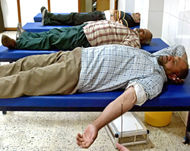Iraqis urge unity as killings continue
A car bomb has killed at least six Shia pilgrims south of Baghdad, the latest in a wave of attacks that has prompted a fresh warning against civil war.

A police spokesman said the blast near a shrine in the town of Musayib on Saturday also wounded 16 people.
Two hours earlier, Abd al-Aziz al-Hakim, leader of the Supreme Council for the Islamic Revolution in Iraq (SCIRI), had urged his followers to stand firm against what he called an al-Qaeda campaign to ignite sectarian war with bombings such as the one on Friday that killed at least 70 people in a Shia mosque.
That triple suicide bombing at the Buratha mosque in Baghdad raised fresh fears of a full-blown communal conflict, with the United States, Britain and the UN urging Iraqi unity.
On Thursday, a car bomb near one of the world’s most sacred Shia shrines killed at least 15 people in Najaf.
On Friday calls were made on national television for Iraqis to donate blood.
Divisive forces
Al-Hakim’s speech, given on the anniversary of the execution of the scholar Muhammad Baqir al-Sadr – the father-in-law of Muqtada al-Sadr, the cleric – and his sister by Saddam Hussein, called for unity between Iraq’s Shia, Kurdish and Arab Sunni communities.
 |
|
Iraqis donate blood at a hospital |
But he also reminded Shias of their decades of suffering under Saddam’s Sunni-dominated government and urged them to resist attempts blamed on Abu Musab al-Zarqawi, said to be the leader of al-Qaeda leader in Iraq, to plunge the country into civil war.
Al-Hakim said: “Militants and insurgents want to return Iraq to Saddam’s formula.
“This nation will not fall into the trap of sectarian war that is being pursued by Zarqawi’s groups.”
Sectarian tensions have been rising since the bombing of a Shia shrine on February 22.
Hundreds of bodies of people shot or strangled have turned up on Baghdad streets bound, blindfolded and showing signs of torture.
 |
|
Abd al-Aziz al-Hakim says |
The latest bombs provided more proof of Iraqi leaders’ failure to tackle violence as they struggle to form a government.
Al-Hakim’s alliance is under pressure to replace Ibrahim al-Jaafari as its nominee for prime minister to break the deadlock over post-war Iraq’s first full-term government.
But al-Jaafari, who is the serving prime minister, refuses to step aside despite calls from Sunni and Kurdish leaders who say he has failed in office. There have even been calls from within his own alliance for him to step aside.
Civil war
Al-Hakim said repeatedly that al-Zarqawi and Saddam loyalists would fail to derail the political process. But four months after parliamentary elections, he could offer no clear timetable on the formation of a government.
“After the guidelines of the [Shia] religious establishment, we will proceed to form a national unity government as soon as possible,” he said.
Bayan Jabor, the interior minister, has said he was confident that al-Zarqawi was no longer a serious threat. But Western intelligence sources disagree and al-Hakim seems just as concerned as ever, saying the whole region would suffer if he is not defeated.
“The battle of today is not just an Iraqi battle. Other countries will suffer and in the future there will be more suffering,” he said. “These militant groups oppose all Arab rulers.”